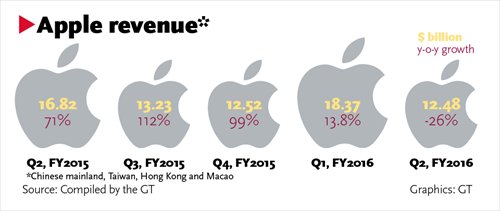
U.S. tech giant appeals ruling to halt some iPhone sales
A recent decision made by the Beijing Intellectual Property Office (BJIPO) on Apple's patent infringement case, which came amid a series of Sino-U.S. trade disputes, has triggered broad public discussions on social media and among experts, with some applauding the decision while others considering it as "being too hard."
Following BJIPO'S decision, Apple and Beijing Zhongfu Communication Equipment Co were supposedly banned from selling the iPhone 6 and iPhone 6 Plus in the Chinese mainland, as the design of the two products closely resembles that of the Mobile (100C), which the agency considers an infringement of the patent rights of Shenzhen-based mobile producer Baili Marketing Service Inc.
But Apple has sued BJIPO, delaying the implementation of the ban.
Apple didn't reply to an e-mail from the Global Times as of press time.
However, the company said in a statement that BJIPO's decision was ridiculous and Apple has filed an appeal before the Beijing Intellectual Property Court, domestic news portal qq.com reported on Monday, citing sources.
Although the statement stressed that its sales remain unaffected, experts predict Apple's sales will take a hit in the near future.
"Apple's distributors are now doing a trade-off, balancing their revenues against Apple's sales prospects in China," Xu Xinming, a senior partner who specializes in intellectual property rights at the Beijing Mingtai Law Firm, told the Global Times on Monday, noting that the BJIPO decision might also damage Apple's reputation.
In the second quarter of the 2016 fiscal year, Apple's sales in the Chinese mainland, Taiwan, Hong Kong and Macao shrunk 26 percent to $12.49 billion from the same period last year, the company's financial report shows.
In April, the government regulator ordered the iBook Store and iTunes Movies closed in China only six months after the services were launched.
Dissenting views
According to the report, Apple is also going to strengthen its interests and rights in the Chinese market, and will probably be more active.
"If Apple safeguards its patent rights in the Chinese market, some domestic mobile producers might be embroiled in endless patent infringement lawsuits," said secretary-general of the industry association Mobile China Alliance, Wang Yanhui.
Media reports said Apple patented 1,759 items in 2015, ranging from overall design to its logo's color, of which domestic mobile producers have copied, said Wang. But he added it's difficult for Apple to sue Chinese mobile brands in their home turf.
While speculations over Apple's influence on domestic mobile producers mounted, Chinese Apple fans have also expressed their concerns to the tech giant on social media platforms like Weibo.
"The decision might be too hard, as there are still significant differences between Apple's products and Baili's Mobile (100C), like the 'Home' button which is unique to Apple products. As an Apple fan, I can easily tell them apart," said a netizen named "Zhongxiadexueye."
Besides, Baili is on the brink of bankruptcy, and the Mobile (100C) has failed in the increasingly competitive Chinese mobile market, Zhong noted, describing Baili's practice as deliberately blackmailing Apple for financial gains.
Response to U.S. clampdown
However, analysts also said this high-profile patent dispute helps patent protection in China as well as the rise of intellectual property rights awareness among the Chinese.
"Like Baili, local companies are increasingly aware of the importance of intellectual property - they are challenging and filing lawsuits against international brands," Wang noted.
BJIPO's decision was also welcomed by supporters of domestic brands. One of them, Li Shaoming, said the BJIPO's decision was just, as the Mobile 100C has a unique design and is made in China.
"I'm applauding the decision. What a beautiful response to the U.S.," Li told the Global Times, linking the case to the U.S. ruling against Chinese firms.
The U.S. government has recently imposed rigid rules on Chinese companies who wish market entry.
Chinese telecom giant Huawei Technologies Co is being investigated by the U.S. Department of Commerce for allegedly exporting U.S. technologies to embargoed countries like North Korea and Iran, various media reports said.
Limits were also imposed on Shenzhen-based tech company ZTE Corp, as the U.S. government claims that the Chinese company's exports to Iran violate U.S. controls, media reports showed.


















































